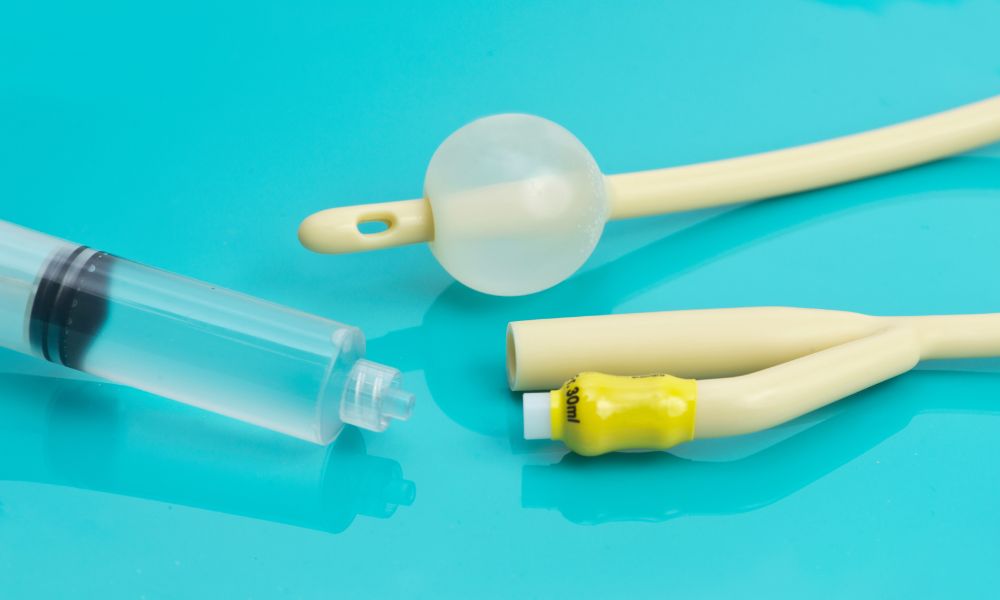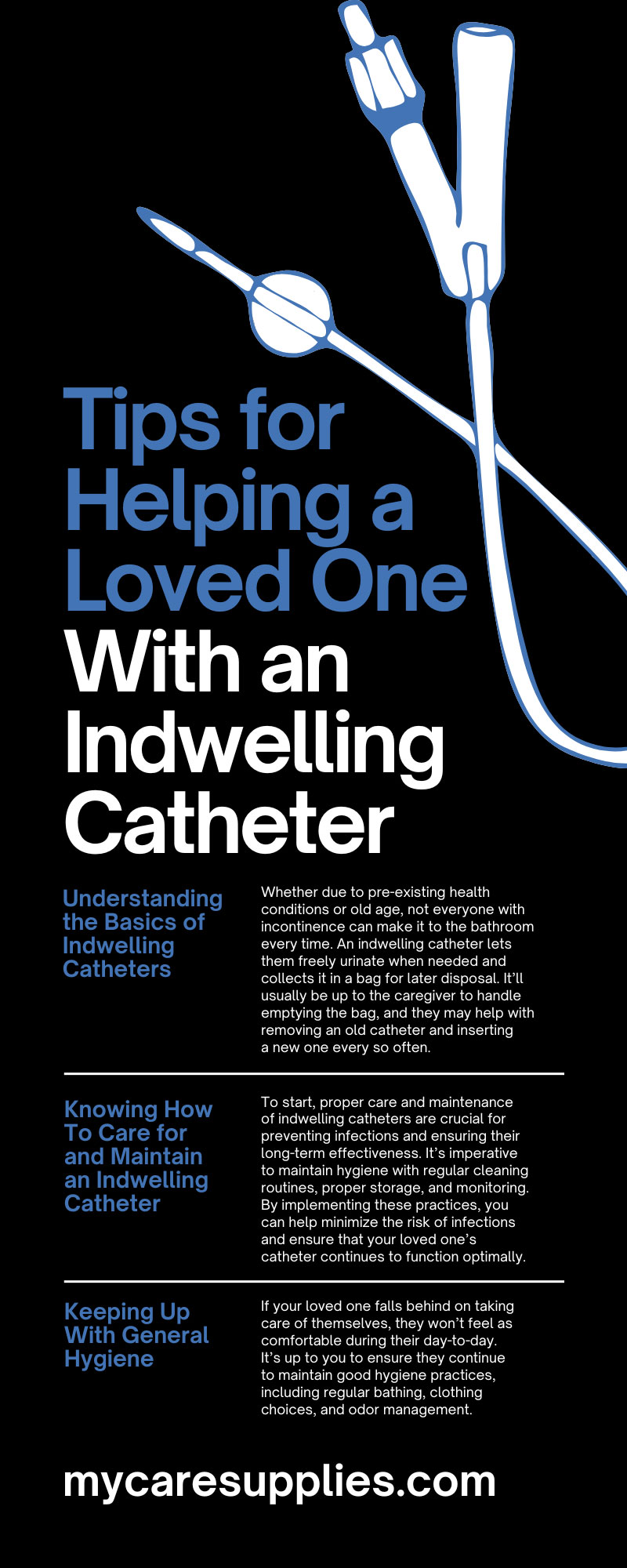8 Tips for Helping a Loved One With an Indwelling Catheter
Posted by Jeanne Lowry on Aug 29th 2023

Dealing with a catheter can be challenging, both for the person using it and their caregivers. This is especially true for caregivers when it comes to indwelling catheters. However, with the right knowledge and understanding, you can ensure your loved one feels comfortable, empowered, and well-cared for. Explore practical tips and advice to help you navigate the complexities of managing an indwelling catheter with confidence and compassion for your loved one.
Understanding the Basics of Indwelling Catheters
Before diving into how to help your loved one, we need to cover the basics of indwelling catheters. Also known as Foley urinary catheters, these devices can greatly improve the quality of life for individuals with certain health conditions by allowing them to urinate without visiting the bathroom.
Whether due to pre-existing health conditions or old age, not everyone with incontinence can make it to the bathroom every time. An indwelling catheter lets them freely urinate when needed and collects it in a bag for later disposal. It’ll usually be up to the caregiver to handle emptying the bag, and they may help with removing an old catheter and inserting a new one every so often.
Even if you’re not the direct caregiver, it’s important that you understand all that goes into indwelling catheter maintenance. If you don’t, it’ll be more difficult to help your loved one in their time of need.
Learning How To Safely and Securely Use a Catheter
Ensuring the safe and secure usage of indwelling catheters is paramount to preventing complications and promoting well-being. For example, it’s a good idea to learn proper catheter insertion techniques, how to secure the catheter in place, and how to spot potential issues.
Of course, teaching your loved one how to do these things will help ensure that they know how to handle issues as soon as they arise instead of after it’s too late. By implementing these safety measures and communicating them to your loved one, you can help maintain the integrity and functionality of your loved one’s indwelling catheter.
Knowing How To Care for and Maintain an Indwelling Catheter
To start, proper care and maintenance of indwelling catheters are crucial for preventing infections and ensuring their long-term effectiveness. It’s imperative to maintain hygiene with regular cleaning routines, proper storage, and monitoring. By implementing these practices, you can help minimize the risk of infections and ensure that your loved one’s catheter continues to function optimally.
Keeping Up With General Hygiene
Of course, hygiene plays a vital role in the overall well-being of individuals outside of using an indwelling catheter. If your loved one falls behind on taking care of themselves, they won’t feel as comfortable during their day-to-day. It’s up to you to ensure they continue to maintain good hygiene practices, including regular bathing, clothing choices, and odor management.
If they have trouble doing any of these activities, you should make it your job to assist them with these things. By prioritizing their general hygiene, you can significantly improve your loved one’s life while they’re using an indwelling catheter.
Supporting Emotional Well-being
Living with an indwelling catheter can have emotional implications for both the user and their loved ones. If you can provide emotional support during this time, your loved one would likely greatly appreciate it. Try actively listening to them, opening up communication between you both, and fostering a supportive environment for their needs.
You should also take the time to learn about coping mechanisms to help your loved one navigate the emotional challenges associated with using a catheter. By offering understanding and empathy, you can play a significant role in promoting your loved one’s emotional well-being.
Trying To Keep Them Active
Another tip for helping your loved one with an indwelling catheter is to keep them active. Having an indwelling catheter doesn’t have to limit one’s ability to engage in fulfilling activities and maintain an active lifestyle. That’s why you should show them how to adapt daily routines, participate in recreational activities, and even travel with a catheter.
While there are some concerns regarding how having a catheter can affect exercising, dressing, and intimate relationships, none of these activities are impossible while using one. By helping your loved one stay active, you’ll empower them to continue pursuing their interests and passions, helping them lead a fulfilling life while managing their incontinence.
Overcoming Challenges Faced by Catheter Users
Using an indwelling catheter won’t always be easy. This product can present various challenges to the user. Problems such as leakage, blockages, and discomfort can make wearing one of these catheters much more difficult.
A trained caregiver will be quite knowledgeable about these issues. However, there will be times when certain problems extend past their general knowledge. In these situations, it’s best to turn to your loved one’s doctor. Following up with healthcare professionals will make it easier to troubleshoot problems that may arise. By equipping yourself with problem-solving strategies, you can ensure a smoother experience for your loved one.
Encouraging Communication and Collaboration With Healthcare Professionals
Since collaboration with healthcare professionals is essential for successfully managing indwelling catheters, it’s crucial to ensure your loved one makes the effort to communicate with their medical team. You can help them prepare questions for doctor visits, learn more about medical terminology, and seek second opinions when necessary. If you build a strong support network for your loved one, you can ensure they receive the best possible care and support possible.
Promoting Independence in the User’s Self-Care
While we’ve already alluded to this in previous sections, promoting independence is crucial for individuals using indwelling catheters. While they might always need a caregiver around for assistance, the more they can do for themselves, the better they’ll feel. While it’s important to help when needed, it’s just as crucial to know when to take a step back and let them handle things. As long as you remain communicative during this whole process, your loved one will learn how to handle these types of problems and situations on their own.
If they’re able to do that, they’ll feel much more confident and self-sufficient. Still, you should always make sure that you’re around to help when needed. Just because they can do some things on their own doesn’t mean they’ll never need assistance again. By encouraging independence in their self-care, you can help your loved one build their confidence and autonomy in managing their own catheter.


